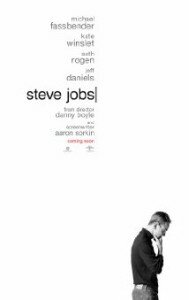Lisa, the daughter whose paternity Steve Jobs denied is the heart of the film about the late Apple CEO.
She even shares the name of a computer he denies was named after her.
 She existed in real life and still does.
She existed in real life and still does.
But in “Steve Jobs” she seems like a narrative barometer designed to register change in the misanthropic visionary played by Michael Fassbender.
Neither she nor the other supporting characters are seen outside his orbit and we always meet them under the same circumstances: in an auditorium shortly before a new product launch.
In 1984 it was for the Macintosh. The Super Bowl commercial celebrating it should have won an Oscar says Jobs, whom Fassbender portrays with manic conviction.
When it failed he was fired and in 1988 Jobs introduced a sleek unit that was more art project than computer. It also failed but led to his retaking the job as Apple chief.
The story closes as he introduces the iMac in 1998, and tells his daughter he is working on a way to replace her brick-sized cassette playing Walkman.
There is no mention of the iPhone, iPad or Jobs’ death by cancer in 2011 at the age 56.
The other characters are: Jobs’ director of marketing, played by Kate Winslet, his enabler and guilty conscience; Seth Rogen as Woz, detail-oriented tinkerer to Job’s aggressive big picture guy; Lisa’s mother, played by Katherine Waterston, either already a mess or made one by his cruelty; Michael Stuhlbarg as the Mac designer who befriends she and Lisa; and Jeff Daniels as the soft drink executive hired to run Apple, and father figure to Jobs who was adopted. Twice.
Each relationship reflects a different side of a socially brutal personality.
And like any good computer his thinking changes as more data is introduced by them over time.
The screenplay by Aaron Sorkin, Oscar winner for “The Social Network,” sets a land speed record for dialogue by the lacerating Fassbender who challenges the phrase “…words will never hurt me.”
The Oscar-winning “Slumdog Millionaire” director Danny Boyle turns those words into something that is already moving when you jump on and being driven at break neck speed. The restless pace creates the illusion of being one long seamless tracking shot, like “Birdman,” in a confined space and in the image of the closed operating systems that makes Apple products, and their creator, unique.
Like Sorkin’s “The West Wing” and “The Newsroom” it unfolds as a series of interactions that are more like collisions in rooms and hallways while Apple fanatics waiting in an auditorium chant and do the wave.
A seminal moment or two, Woz and Jobs tinkering in a lighted suburban garage at night, is seen in flashback. And in the very first scene, in which he anguishes and harangues about a technical glitch that threatens to scuttle the Macintosh launch – he wants it to say “Hello” – the film not only introduces his Aspergers tendencies, but also highlights Boyle and Sorkin’s flair for finding drama in them.
***1/2 Three and one half stars
With Michael Fassbender, Kate Winslet, Seth Rogen, Jeff Daniels, Michael Stuhlbarg, Katherine Waterston, Perla Haney-Mardine, Rip;ley Sobo, Makenzie Moss. Produced by Danny Boyle, Guymon Casady, Christian Colson, Mark Gordon, Scott Rudin. Written by Aaron Sorkin. Directed by Danny Boyle.Rated R; language. Approximate running time 122 minutes.
Tags: Aaron Sorkin, Apple, Danny Boyle, Lisa, Macintosh, Michael Fassbender, Steve Jobs Posted by